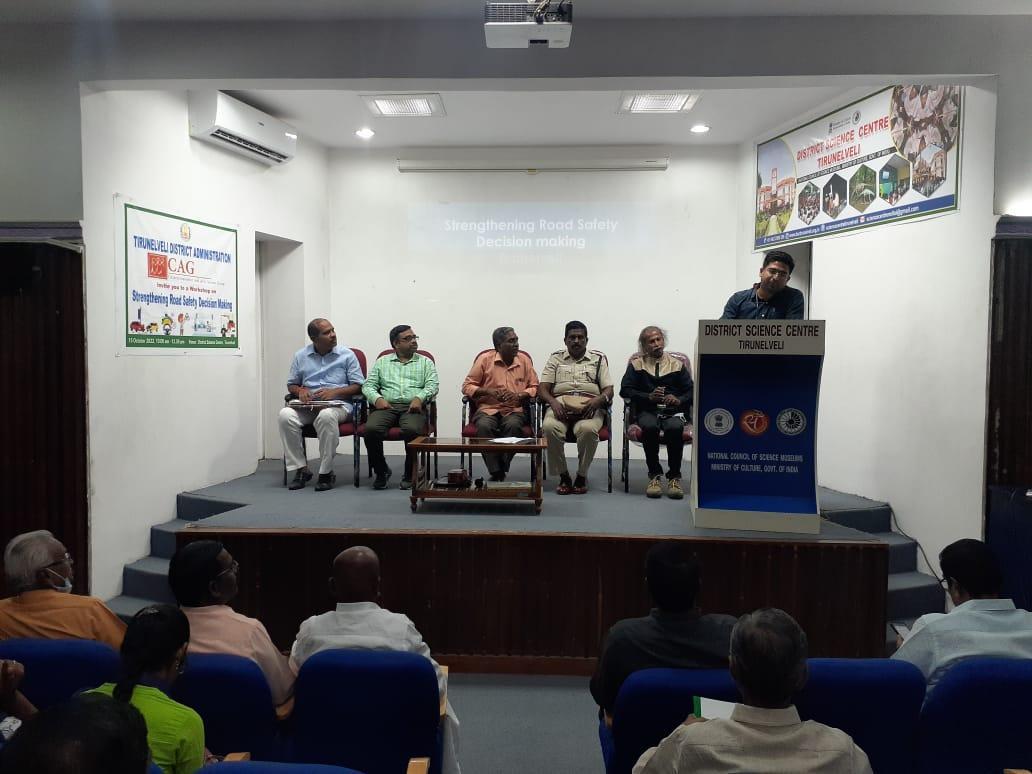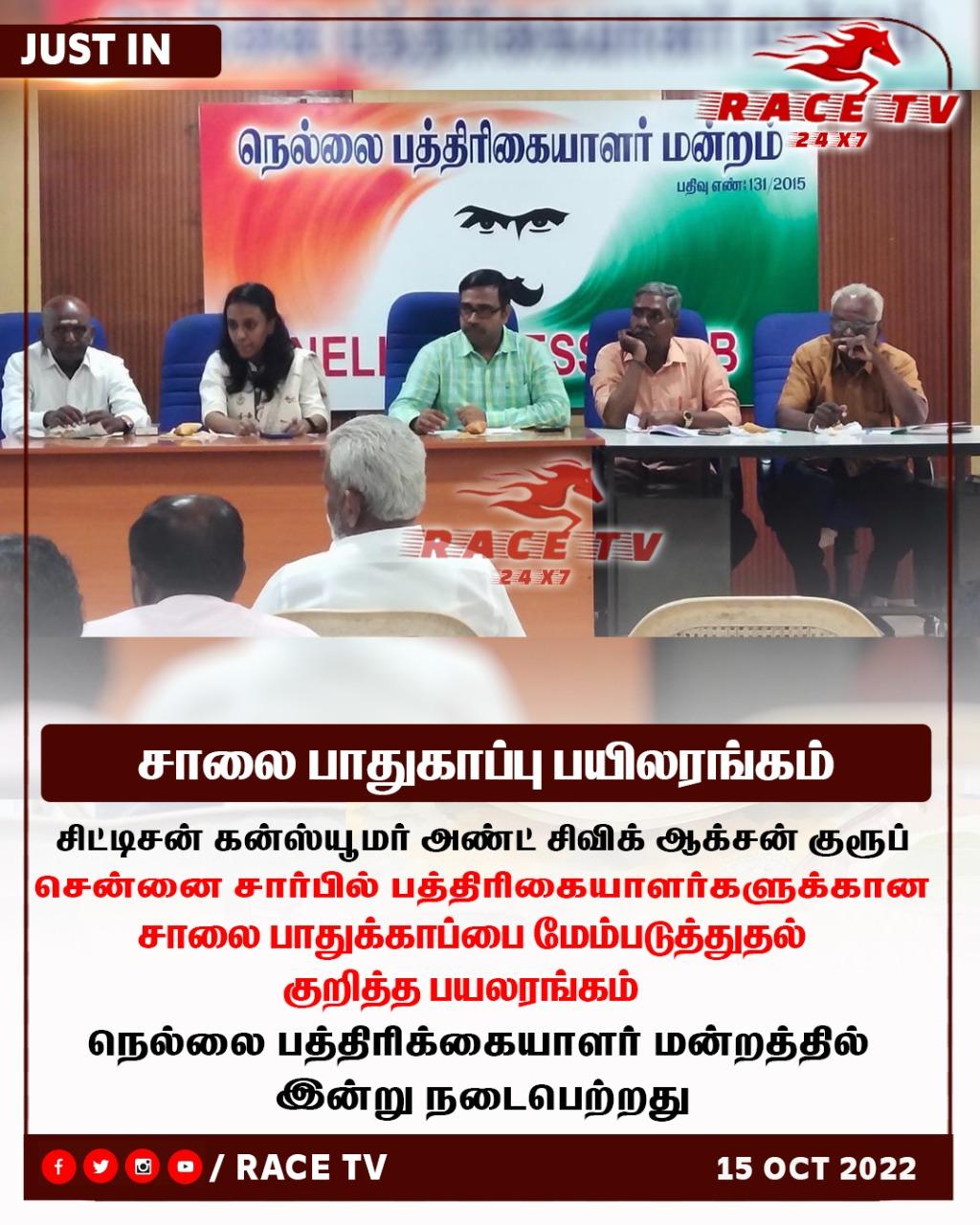Tamil Nadu continues to hold its place as one of the top 5 states for road fatalities (Road Accidents in India, 2020). This is despite the consistent steps since 2017, taken by the state to improve road safety. Institutional changes, data-driven approaches, and improved law enforcement have only borne limited fruit. What then will work? How are countries around the world strengthening road safety? Are there lessons for Tamil Nadu from this? CAG, Chennai, in collaboration with the District Administration of Tirunelveli organised a workshop on ‘Strengthening Road Safety Decision Making’, to understand global best practices on road safety such as stronger legislation and increased penalties to act as deterrents. The Motor Vehicles Amendment Act, 2019 (MVAA) brings in these key features - increased penalties, accountability of infrastructure contractors, road safety audits, and improved data collection. The MVAA also incorporates elements of the Safe Systems Approach that seeks to reduce deaths to zero by focusing on 3 components - safer roads, safer vehicles, and safer road users. This has been used by countries around the world to drastically cut road fatalities; and one that can be used by Tamil Nadu’s government departments and CSOs.
Dr. Ganapathy Subramanian, our local partner, welcomed the gathering. The District Collector, Thiru.V.Vishnu, I.A.S., inaugurated the workshop and said that these discussions on global best practices and knowledge sharing are essential to improve road safety management. He also highlighted the challenges in managing various categories of roads (National Highways, State Highways, rural roads, etc.) and funding different road works. He stressed the need for sustained coordinated action from all departments and government authorities. He pointed out that the remedial engineering measures taken at a blackspot in Gangai Kondan, now a fatality-free spot, were the result of such coordinated action. “Road safety management can be made robust by addressing pre-crash, at the scene of the crash, and post-crash concerns'”, he said. He also quoted Germany’s autobahn system of well-engineered interstate highways as an example to look up to and refrain from making engineering mistakes in our Indian road design. He underlined the need to anticipate and plan for future changes while designing interstate road networks. . He applauded the various initiatives taken by the Government of Tamil Nadu for post-crash care such as Innuyir Kaapom Thittam and the establishment of trauma care centers at regular intervals in districts. He concluded by saying that such discussions around road safety should not be a one-time activity; rather, there should be a formal system for continuous feedback loops from the decision-makers and the public to steer road safety action. He also said such a system at the district administration level for Tirunelveli is on the cards.

? Key note address by District Collector Thiru.V.Vishnu, IAS | Photo: CAG
Dr. P.Vedagiri, Dean-Infrastructure Support and Planning, IIT - Bombay who is known for his works on Transportation System Engineering, spoke on proactive traffic safety evaluation explaining various methods and tools used. He pointed out that Tamil Nadu continues to remain one of the top five states with regard to the annual number of road crashes and that two-wheelers followed by pedestrians are the two vulnerable road user categories mostly involved in road crashes in 2020. In order to improve this scenario and strengthen road safety, he emphasised the need for road safety audits, increased enforcement to keep a tab on road risks and user behaviour, and the design of roads as per IRC (Indian Roads Congress) standards. He also highlighted that with speeding, the severity of a road crash increases, resulting in an increased risk of a fatality. He also discussed the need for a robust licensing procedure for drivers and imparting basic road sense through advanced training tools such as driving simulators. He concluded by encouraging road users to follow the 2-second rule (i.e. the rule of thumb for drivers to maintain a safe following distance at any speed), and be aware of vehicle blind spots.
Dr. Moses Santhakumar, Professor, Civil Engineering Department, NIT- Tiruchirappalli, an expert in traffic safety and expert systems, spoke on the application of Intelligent Transport Systems in traffic management as well as in road crash analysis. He explained the various technological advancements to create intelligent roads and vehicles. He also pointed out that
this will aid efficient monitoring of road user behaviour and enforcement. He discussed various examples such as “glow in the dark'' road markings, pedestrian/obstacle detection systems, and vehicle stability and warning systems. He underlined the need to collectively work towards making Tamil Nadu’s roads safer to traverse.
Presenting the global perspective, Sandeep Gaikwad, Senior Project Associate from the CSO, Parisar, spoke of the need to bring the Safe Systems Approach into road safety planning and management in India.
Ms.Varsha Vasuhe. V, Researcher (Architect – Urban Planner), spoke on CAG’s work so far on advocacy and engagement with various stakeholders including the citizens, unions, government officials, and policymakers. The work areas largely cover research on road safety legislation in Tamil Nadu, its status and implementation in various districts, and compliance with road rules and enforcement. She also highlighted the findings from the helmet and seatbelt compliance study conducted across 15 selected intersections in the district. The findings revealed that out of the 16858 two-wheelers surveyed, 55% of the drivers and 97% of the pillion riders did not wear helmets. Similar alarming rates of non-compliance were also seen amongst car users. It was observed that out of the 4019 cars surveyed, 57% of the car drivers, 64% of the front seat passengers, and 82% of the rear seat passengers did not strap their seatbelts on. The findings underlined the need to implement the increased penalties as per MVAA 2019 to instill in motorists the habit to comply with using safety gear, an ideal preventive measure of road crash injuries and deaths.
The workshop concluded with notes by the Regional Transport Officer Thiru. M.Chandrasekar, Additional Superintendent of Police Thiru. Raju and Mr.Salim, Consumer Awareness Movement, Kallidaikurichi. The workshop witnessed the participation of the District Road Safety Committee members and other decision makers. The workshop highlighted the need for immediate action with scientific underpinnings to move Tamil Nadu to a position of leadership in road safety.
Regional Media Workshop
Date: 15.10.2022 Venue: Press Club, Tirunelveli
A regional media workshop spearheaded by CAG (Citizen consumer and civic Action Group) in collaboration with its local partner, Dr.Ganapathy Subramanian was conducted at the Press Club of Tirunelveli on October 15th, 2022. The workshop discussed the role of journalists in improving road safety in the district and encouraged them to cover road crashes more sensitively through a pro-people narrative; highlighting risky road behaviours, the various causal factors of a road crash, enforcement strategies, and holding the government accountable in case of discrepancies. Handouts compiling Tamil Nadu’s road crash statistics and findings from the helmet and seatbelt compliance study conducted across 15 major intersections in Tirunelveli district were distributed to the participants. The workshop also discussed the need to use data backed facts to highlight the seriousness of road risks, such as non-compliance with wearing safety gear, drunk driving, distracted driving, speeding etc.
The key highlights from the workshop, Strengthening Road Safety Decision Making, presided over by the District Collector V.Vishnu IAS., with participation from academicians (Prof. Dr.P. Vedagiri from IIT-B and Prof.M.Santhakumar from NIT-Tiruchirapalli) and the District Road Safety Committee members to promote an ‘Accident-Free Nellai’ were also discussed and quoted. The media workshop witnessed the participation of more than 25 local journalists including senior reporters of visual and print media. The event received significant media coverage and kick-started various discussions around improving road safety in the district.

? News byte on the regional media workshop, Tirunelveli | Race TV